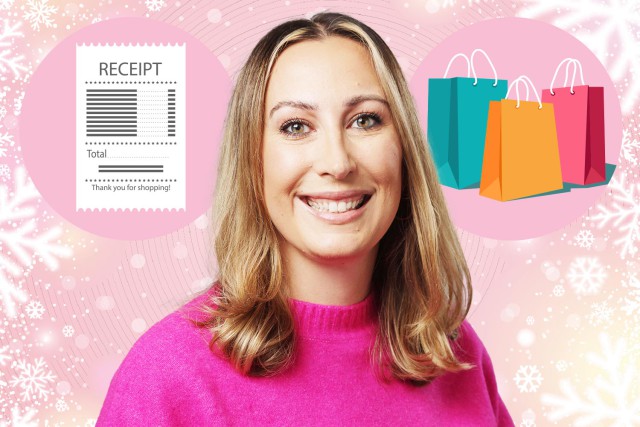Every Christmas you're bound to receive some unwanted presents that you'd rather have stayed under the tree.
You might also treat yourself to a gift but later discover it's not as described or not fit for purpose.
Lisa Webb, lawyer and consumer rights expert at Which? shares her top tips
So if you've found yourself in a pickle over presents and gifts this Christmas, then it's worth knowing your rights.
Lisa Webb, a consumer law expert at Which?, explains the four key phrases you need to unlock refunds or get your items fixed.
Phrase 1: Consumer Rights Act
The Consumer Rights Act sets out your rights when you buy products, services and digital content.
Lisa says it's important everyone familiarises themselves with what this covers.
She said: "Under the Consumer Rights Act all products must be of satisfactory quality, fit for purpose and as described.
"The rules also include digital content in this definition."
So all products – whether physical or digital – must meet the following three standards:
- Fit for purpose – the goods should be fit for the purpose they are supplied for, as well as any specific purpose you made known to the retailer before you agreed to buy the goods.
- As described – the goods supplied must match any description given to you or any models or samples shown to you at the time of purchase.
- Satisfactory quality – goods shouldn't be faulty or damaged when you receive them. Lisa said you should ask what a reasonable person would consider satisfactory for the goods in question. For example, bargain-bucket products won't be held to as high standards as luxury goods.
The Consumer Rights Act gives you the legal right to either get a refund for goods that are of unsatisfactory quality, unfit for purpose or not as described, or get it repaired – depending on how long you've owned it.
If you've owned the item for less than 30 days you can claim a full refund for goods that are of unsatisfactory quality, unfit for purpose or not as described.
If you've owned it for between 30 days and six months you must give the retailer one opportunity to repair or replace it before you can claim a refund.
And if you've owned the item for six months or longer you must give the retailer one opportunity to repair or replace it before you can claim a partial refund, and the burden of proof is on you to prove the product is faulty.
Lisa added: "If you'd prefer a repair or replacement in the first 30 days you can ask the retailer, but it cannot refuse to give you a refund."
Phrase 2: Cooling off
If you're buying goods or services from a company online, over the phone or via mail order, you should be given a "cooling-off period", said Lisa.
This is the period of time you have to change your mind about something you've purchased from a distance.
Lisa said: "For most goods or services, you should be given a cooling-off period of at least 14 days under the Consumer Contracts Regulations.
"But cooling-off periods don't apply to purchases or services bought from a private individual."
When the 14-day cooling period starts depends on whether the contract is for goods or a service.
For goods purchased at a distance, the 14-day cooling period starts from the date you take ownership of the goods, according to Lisa.
You can cancel the goods at any time from the moment you place your order and up to 14 days from the date they arrive.
But you'll need to tell the seller within 14 days of taking ownership that you want to cancel.
Lisa said: "The easiest way to do this is by emailing them so you have a written record.
"If this isn't possible and you need to phone, make sure you make a note of who you speak to and what was agreed.
"Then, follow up with a letter or email."
You have a further 14 days from when you cancelled to return the product.
The seller should refund the cost of standard delivery you paid when you purchased the product, but you'll usually have to pay to return the product.
Phrase 3: Goodwill
Most retailers choose to provide a "goodwill' returns policy, offering an exchange, refund or credit note for most returns.
Lisa said: "You can only return store-bought non-faulty goods for an exchange or refund if the retailer has a returns policy.
"It's worth noting that shops aren't required by law to have a returns policy, but if they do have one they must stick to it."
Returns policies are usually displayed on receipts, on signs in store and online.
You can also ring the retailer's customer services line to find out about its returns policy.
Phrase 4: Chargeback
Chargeback enables you to dispute a card transaction and request your money back for something you've paid for.
It offers protection if you've been let down when buying goods or paying for services.
Lisa said: "If you've exhausted the retailer or service provider's complaints procedure and haven't reached a solution, or they've gone out of business, you can contact your bank to make a chargeback claim.
"It can apply if goods are damaged, not as described, or haven't been delivered."
When you initiate a chargeback, your bank withdraws funds that were previously deposited into the recipient's bank account and puts them back into your account.
The recipient may dispute a chargeback with the bank if it can prove it is invalid.
Chargeback is available on all goods bought on debit card, though exact rules may vary
Did you miss our previous article…
https://hellofaread.com/money/high-street-suffers-as-iconic-shops-shut-their-doors-in-2023/








